Mike Purdy to Step Down as Executive Vice President for Research

Dear fellow members of the Columbia community:
I write to share that G. Michael Purdy will be retiring from his position as the University’s Executive Vice President for Research on December 31, 2019. In the almost nine years that Mike has served in this role, Columbia has strengthened core research oversight and compliance functions, brought structure to our support for postdoctoral students, and, in partnership with our schools, built the research infrastructure needed to be at the forefront of scientific discovery and to recruit and retain top talent.
Mike has been an outstanding partner in developing the flagship institutes that have come to define fundamental science research at Columbia, including the Mortimer B. Zuckerman Mind Brain Behavior Institute, the Data Science Institute, the Precision Medicine Initiative, and the Herbert and Florence Irving Institute for Cancer Dynamics. Also during this period, our nanotechnology and quantum science and engineering initiatives took shape and are growing in stature. Mike has cultivated scholarly talent and developed a culture of mutual support and collaboration among department chairs. His determination to mitigate the burden our researchers face in meeting ever-expanding regulatory requirements is a legacy that will continue to benefit our faculty, whose time and talents Mike so deeply respects.
When I asked him to take on this leadership role, Mike had already enjoyed a storied career as a marine geophysicist and beloved Director of the Lamont-Doherty Earth Observatory. Earlier, he had distinguished himself at the National Science Foundation and the Woods Hole Oceanographic Institution, gaining the experience that has made him so effective in mentoring young scientists and in developing our research enterprise.
Most of all, Mike’s laconic manner, quiet wisdom, and reassuring presence have been deeply valued, and will be missed, by all who have had the good fortune to work with or for him. He possesses a rare capacity for translating ethereal ambitions into tangible reality, a precious skill for any world-class research university. Mike is perhaps the last person at Columbia to seek credit for his personal contributions when collaborating with others. Nevertheless, his many University partners in these efforts appreciate that, for the better part of a decade, his dedicated leadership has been indispensable to strengthening research at Columbia. He has been our captain.
I will soon announce an advisory group I have formed to assist in identifying Mike’s successor. For now, please join me in thanking Mike for his years of tireless service to Columbia.
Sincerely,
Lee C. Bollinger